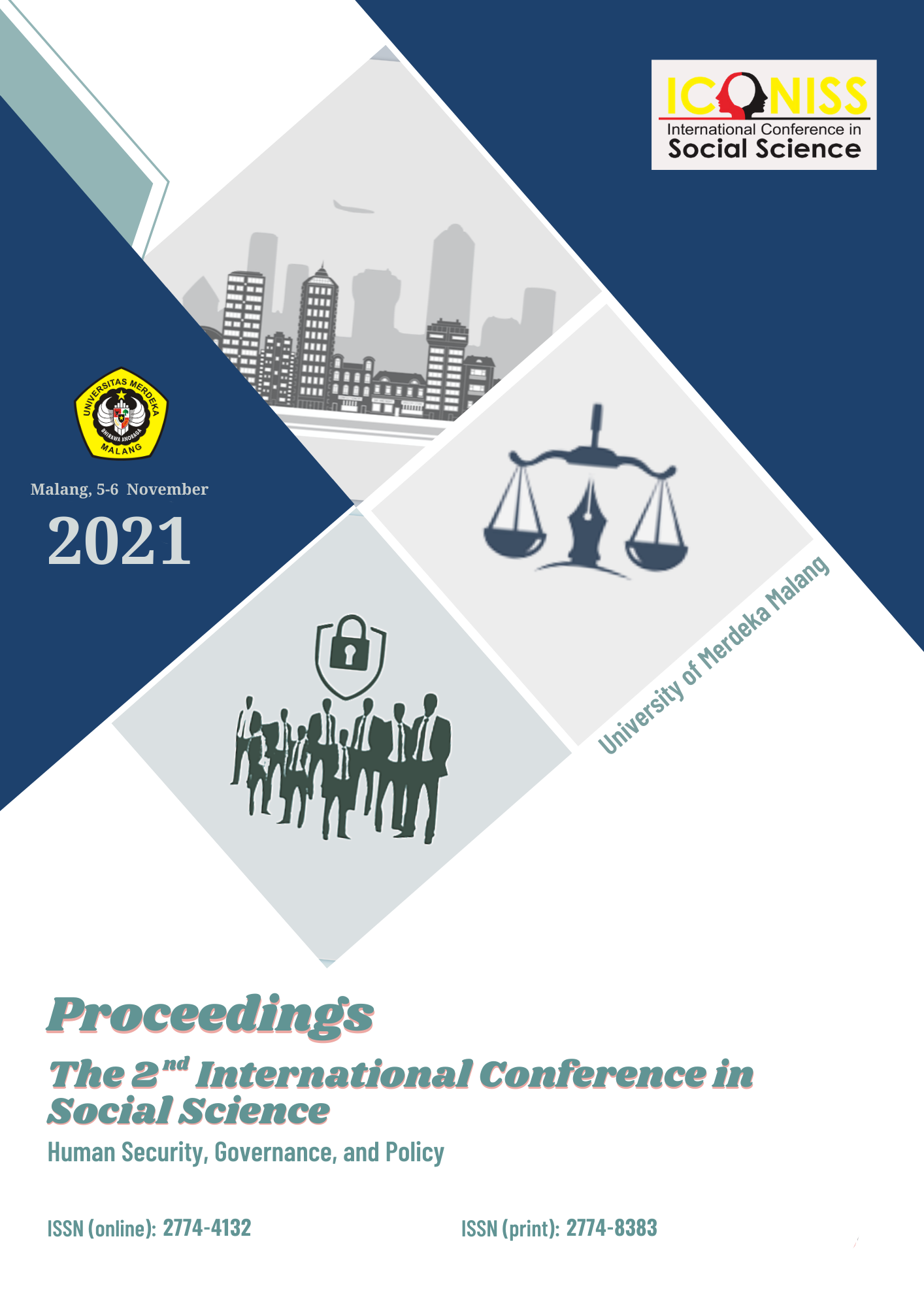Conference Archives
4TH INTERNATIONAL CONFERENCE IN SOCIAL SCIENCE (ICONISS) 2023
–
Human security is one of contemporary global issues that has received considerable attention from academics as well as policy makers across the globe these days, given the situation in the era of digital revolution 4.0 that imposes more challenging circumstance. In addition, humanitarian crisis have been dominant issue that continue to feature in any academic discussions about any possible challenges that come ahead. This situation becomes quite alarming and requires considerable attention from stakeholders to contribute their knowledge in mitigating humanitarian issues such as problems of refugees over conflict and physical violence, children and women trafficking, world hunger (food scarcity), illegal arms trafficking, human rights violations, terrorism and radicalism (intolerant behavior), and so forth.
>>REGISTRATION & PAYMENT<<
>> ARTICLE TEMPLATE <<
KEYNOTE SPEAKER
| Prof. Dr. Pratikno, M.Soc., Sc. Minister of State Secretary of Indonesia
Prof. Dr. Pratikno, M.Soc., Sc. completed his undergraduate studies, earning a Bachelor's degree (Drs.) in Political Science from the Faculty of Social and Political Sciences at Universitas Gadjah Mada in Indonesia in 1985. He then pursued their postgraduate studies, obtaining a Master's degree (M.Soc.Sc.) in Development Administration from Birmingham University in the UK in 1990. Continuing his academic journey, he achieved a Ph.D. in Political Science from Flinders University in Australia in 1997. His impressive academic achievements led to their appointment as a Professor of Political Science at Universitas Gadjah Mada in Indonesia in December 2008.
The publications authored by Prof. Dr. Pratikno, M.Soc., Sc cover various topics related to governance, public administration, and politics in Indonesia. These publications have been featured in reputable journals and are associated with the Magister Administrasi Publik (MAP) program at Universitas Gadjah Mada. Some of the publications include "Governance dan Krisis Teori Organisasi" (Governance and Crisis in Organizational Theory), "Urgensi Reformasi Basis Kekuasaan Birokrasi di Indonesia" (The Urgency of Reforming the Power Basis of Bureaucracy in Indonesia), and "Manajemen Jaringan dalam Perspektif Strukturasi" (Network Management in the Perspective of Structuration). These publications delve into topics such as governance challenges, bureaucratic reform, and network management in the context of public administration. Additionally, he has contributed to journals like the PCD Journal (Political, Communication, and Development Studies Journal). Publications in this journal include "From Populism to Democratic Polity: Problems and Challenges in Surakarta, Indonesia," "Local Politics in Indonesia, 1999-2010: A Literature Review," and "Struggle to Gain Representation: Mixed Politics in Democratising Indonesia." These articles explore subjects like democratic governance, local politics, and the struggle for political representation in Indonesia. Overall, his publications offer valuable insights into governance, public administration, and politics, providing a scholarly perspective on key issues in Indonesia's context.
He was the rector of Universitas Gajahmada from 2012-2014. He became the Minister of State Secretary of Indonesia from 2014 until now.
|
INVITED SPEAKER
| Prof. Drs. Purwo Santoso, MA., Ph.D Gadjah Mada University, Indonesia
Purwo Santoso is lecturer on Governance and Public Policy at Gadjah Mada University. He is currently in charge as Head of Postgraduate Study on Political Science at Gadjah Mada University in Indonesia, which run both Master and Ph.D program. He conducted reseach of politics of the environmental policy-making, democracy and democratization, as well as decentralization and local government in Indonesia.
Purwo Santoso got his Ph,D from London School of Economics and Political Science in 1998, after took his master on International Development Studies at Saint Mary's University in Canada. His undergraduate degree was granted by Gadjah Mada University.
The current research he is chairing on Power, Wealth and Democracy in Indonesia.
|
| Dr. Sophea Prum, Ph,D Cambodia Technology and Science University, Cambodia
Dr. Sophea Prum is the Vice Dean of Engineering and Business Development Officer. She received her PhD from University of La Rochelle, France. With over 10 years of experiences in both international academic institutions and industries especially expertise in AI, Fintech, and Business Development.
Dr. Sophea Prum is visionary leader who is passionate in applying technology to transform traditional to smart industry and society adapted to Industrial Revolution 4.0 era.
|
| Prof. Dr. Aries Roda Romallosa Central Phillippine University, Phillippine
Prof. Dr. Aries Roda Romallosa is a Professor 6 and presently the Chairperson of the Department of Agricultural Engineering and Environmental Management of Agriculture, Resources and Environmental sciences (CARES) of Central Philippine University, at Iloilo City, Philippines.
She earned her PhD in Environmental Engineering with Cum Laude predicate from Bauhaus-Universitat Weimar, Germany in 2017. She earned her master degree in Environmental Enginering with the Awardee as Best Project Paper from University of St. La Salle (USLS), Bacolod City, Negros Occidental, Philippines in 2008. Her Bachelor Degree is from Central Philippine University.
She has been teaching for more than 20 years. She has received many awards since 2001 with the latest award as Recipient of the Len and Joy Edge Professional Chai Award in 2019. She is an active researcher that has receive in-house and externally funded projects and grants leading to international and local journal publications and paper presentations/lecturer in many places.She has published more than 20 articles in the Reputable Journal and Conference Proceedings. She also has completed many projects in the Philippines and Germany. She led the World Bank’s Panibagong Paraan Project Grant Competition with 1 Million Philipine Pesos grant. One of the latest project by Prof. Romallosa is the Blue Ocean project funded by USAID.
|
| Dr. Sukardi, M,Si University of Merdeka Malang, Indonesia
Dr. Sukardi, M.Si., is the Vice Rector for Academic Affairs at Universitas Merdeka Malang. He is a lecturer in the Faculty of Social Sciences at Universitas Merdeka Malang. Throughout his career, he has written over 50 articles focusing on Good Governance and Government Policy.
|
CALL FOR ABSTRACT & PAPER ICONISS 2023:
We invite authors to submit the best articles in the fields of Social, Culture, Social (Equalities and Green Governance, Blue Constitutions in Social Justice, Poverty Alleviation and Reducing Inequalities, Democracy, Local Politics, and Protecting Natural Resources, Innovative Public Policies under VUCA Era). for publication with the following schedule:
Start of 3rd regular Registration: August 31, 2023
Abstract submission deadline: September 01, 2023
Full paper submission deadline: September 14, 2023
Conference day: September 16, 2023 (ICONISS)

Sustainability for Deep Governance Issues Sub-themes 1. Social Equalities and Green Governance 2. Blue Constitutions in Social Justice 3. Poverty Alleviation and Reducing Inequalities 4. Democracy, Local Politics, and Protecting Natural Resources 5. Innovative Public Policies under VUCA Era (Volatility, Uncertainty, Complexity, and Ambiguity) 6. Digital Public Service in Education and Health
Sustainability and Smart Cities 1. Cities and Digital Revolution Aligning Technology and Humanity 2. How do Cities Cope with Illegal Settlement? 3. Slum Communities and Economics Integration in Cities 4. Living in City with Limited Land Space 5. Innovative Clean Energy in Cities
|
|
_.jpg)
REVIEW PROCEDURES
ICONISS 2023 uses a double-blind review, which means that both the reviewer’s and author’s identities are concealed throughout the review process. The review process is expected to take one (1) to two (2) weeks. The following are the four main steps of the review process.
The completed manuscript uploaded by the author(s) to the ICONISS website is then assigned by the Section Editor to see the editorial process.The editor will invite reviewers to assess and judge the submitted manuscript properly.The result of the review will be communicated to the editor for onward transmission to the author(s).If required, the author(s) will revise the manuscript in light of the reviewers’ comments and suggestions and resubmit the manuscript. When the manuscript is finally accepted, the editor will schedule the publication and inform the author(s).
REVIEW POINT
ICONISS is committed to publishing innovative and sustainable research results with an open-access peer-reviewed process that mediates the dissemination of academicians, researchers, and practitioners in engineering, science, and technology. ICONISS uses a double-blind review, which means that both the reviewer’s and author’s identities are concealed throughout the review process. The review process is expected to take one (1) to two (2) weeks. The scopes of ICONISS are Social Equalities and Green Governance, Blue Constitutions in Social Justice, Poverty Alleviation and Reducing Inequalities, Democracy, Local Politics, and Protecting Natural Resources, Innovative Public Policies under VUCA Era (Volatility, Uncertainty, Complexity, and Ambiguity).
REVIEWERS
ICONISS has recruited reputation and professional reviewers from universities and institutions worldwide, such as Cambodia, Philippines, Russia, Thailand, Japan, etc. ICONISS is committed to ensuring the review process is done without conflict of interest and to ensuring the scientific process’s rigorous standards by participating in the peer-review system. Reviewers uphold the integrity of the manuscript by identifying invalid research and helping to help prevent ethical breaches by identifying plagiarism, research fraud and other problems by dint of their familiarity with the subject area.
Publication Ethics
Duties of Authors
- Reporting Standards: Authors of reports of original research should present an accurate account of the work performed as well as an objective discussion of its significance. Underlying data should be represented accurately in the paper. A paper should contain sufficient detail and references to permit others to replicate the work. Fraudulent or knowingly inaccurate statements constitute unethical behaviour and are unacceptable.
- Originality and Plagiarism: The authors should ensure that they have written entirely original works, and if the authors have used the work and/or words of others that this has been appropriately cited or quoted.
- Multiple, Redundant or Concurrent Publication: An author should not, in general, publish manuscripts describing essentially the same research in more than one journal or primary publication. Submitting the same manuscript to more than one journal concurrently constitutes unethical publishing behaviour and is unacceptable
- Acknowledgement of Sources: Proper acknowledgement of the work of others must always be given. Authors should cite publications that have been influential in determining the nature of the reported work.
- Authorship of the Paper: Authorship should be limited to those who have made a significant contribution to the conception, design, execution, or interpretation of the reported study. All those who have made significant contributions should be listed as co-authors. Where there are others who have participated in certain substantive aspects of the research project, they should be acknowledged or listed as contributors. The corresponding author should ensure that all appropriate co-authors and no inappropriate co-authors are included on the paper and that all co-authors have seen and approved the final version of the paper and have agreed to its submission for publication.
- Disclosure and Conflicts of Interest: All authors should disclose in their manuscript any financial or another substantive conflict of interest that might be construed to influence the results or interpretation of their manuscript. All sources of financial support for the project should be disclosed.
- Fundamental errors in published works: When an author discovers a significant error or inaccuracy in his/her own published work, it is the author’s obligation to promptly notify the journal editor or publisher and cooperate with the editor to retract or correct the paper.
- Hazards and Human or Animal Subjects: If the work involves chemicals, procedures or equipment that have any unusual hazards inherent in their use, the author must clearly identify these in the manuscript.
Duties of Editors
- Fair Play: An editor at any time evaluate manuscripts for their intellectual content without regard to race, gender, sexual orientation, religious belief, ethnic origin, citizenship, or political philosophy of the authors.\
- Confidentiality: The editor and any editorial staff must not disclose any information about a submitted manuscript to anyone other than the corresponding author, reviewers, potential reviewers, other editorial advisers, and the publisher, as appropriate.
- Disclosure and Conflicts of Interest: Unpublished materials disclosed in a submitted manuscript must not be used in an editor's own research without the express written consent of the author.
- Publication Decisions: The editor board journal is responsible for deciding which of the articles submitted to the journal should be published. The validation of the work in question and its importance to researchers and readers must always drive such decisions. The editors may be guided by the policies of the journal's editorial board and constrained by such legal requirements as shall then be in force regarding libel, copyright infringement and plagiarism. The editors may confer with other editors or reviewers in making this decision.
- Review of Manuscripts: The editor must ensure that each manuscript is initially evaluated by the editor for originality. The editor should organise and use peer review fairly and wisely. Editors should explain their peer review processes in the information for authors and also indicate which parts of the journal are peer reviewed. The editor should use appropriate peer reviewers for papers that are considered for publication by selecting people with sufficient expertise and avoiding those with conflicts of interest.
Duties of Reviewers
- Contribution to Editorial Decisions: Peer review assists the editor in making editorial decisions and through the editorial communications with the author may also assist the author in improving the paper.
- Promptness: Any selected referee who feels unqualified to review the research reported in a manuscript or knows that its prompt review will be impossible should notify the editor and excuse himself from the review process
- Standards of Objectivity: Reviews should be conducted objectively. Personal criticism of the author is inappropriate. Referees should express their views clearly with supporting arguments.
- Confidentiality: Any manuscripts received for review must be treated as confidential documents. They must not be shown to or discussed with others except as authorised by the editor.
- Disclosure and Conflict of Interest: Privileged information or ideas obtained through peer review must be kept confidential and not used for personal advantage. Reviewers should not consider manuscripts in which they have conflicts of interest resulting from competitive, collaborative, or other relationships or connections with any of the authors, companies, or institutions connected to the papers.
- Acknowledgement of Sources: Reviewers should identify relevant published work that has not been cited by the authors. Any statement that an observation, derivation, or argument had been previously reported should be accompanied by the relevant citation. A reviewer should also call to the editor's attention any substantial similarity or overlap between the manuscript under consideration and any other published paper of which they have personal knowledge.
3RD INTERNATIONAL CONFERENCE IN SOCIAL SCIENCE (ICONISS) 2022
November 4, 2022 – November 5, 2022

2ND INTERNATIONAL CONFERENCE IN SOCIAL SCIENCE (ICONISS) 2021
Malang
November 5, 2021 – November 6, 2021
| |||||||||||||||||||
Conference Summary :
| The international conference organized by the University of Merdeka Malang this time focused on sustainable innovations by encouraging an interdisciplinary approach from the perspectives of public policy, economics, law, and technology. Indeed,bringing together opposing viewpoints for a discussion or debate is not always easy. However, bringing diverse viewpoints together at an international conference is necessary to facilitate the interplay of thoughts and experiences in an atmosphere conducive to the interchange of the finest ideas and concepts. | ||||||||||||||||||
Keynote Speakers : | 1. Prof. Dr. Ir. Suprapto, DEA (Chairman of LLDIKTI 7, Indonesia) 2. Assoc. Prof. Kazi Sohag (Ural Federal University, Russia) 3. Prof. Dr. Syed HassanAlsagoff (Islamic Dev.Bank, Singapore) 4. Prof. Dr. Serkan Dilek (Kastamonu Universitesi, Turkey) 5. Prof. Dr. Takashi Yasuno (Tokhusima University, Japan) 6. Prof. Dr. Eko Prasojo (Universitas Indonesia, Ketua IAIP, Indonesia) 7. Prof. Dr. Normah Omar (UiTM, Malaysia) 8. Prof. Dr. Hannah Buxbaum (Indiana University, USA) 9. Prof. Dr. Grahita Chandrarin,M.Si., Ak.,CA (UNMER Malang,Awardee WCP 2021) |
Technical Support and Contact Person
1ST INTERNATIONAL CONFERENCE IN SOCIAL SCIENCE (ICONISS) 2020
Malang, ID
November 5, 2020 – November 6, 2020
| |||||||||||||||||
Conference Summary :
| The international conference on human security, governance, and policy initiates crucial conversation and takes a part in mitigating issues about human security, as a fundamental platform in the policy development of politics, economics, and Socio-cultures in both developed and developing countries. Human security is one of the contemporary global issues that has received considerable attention from academics as well as policymakers across the globe these days. In the area of digital revolution 4.0, it has given the situation that imposes more challenging circumstances. The humanitarian crisis has been a dominant issue that continues to feature in any academic discussions about any possible challenges that come ahead. It addresses the responsibility of the government to mitigate issues of economic security, food security, health security, environmental security, personal security, community security, and political security. These seven components are further simplified into three main components. |
ICONISS Indexed and Include Database on :
Technical Support and Contact Person





2.png)






